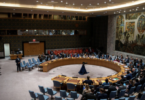WASHINGTON (AFP): The US pointman on Iran warned Wednesday of uncertain prospects for reviving a nuclear deal and said Tehran would face a new pressure campaign if it clung to its demands.
Rob Malley, who has led more than a year of indirect talks with Iran in Vienna, nonetheless told Congress that President Joe Biden’s administration still supported the 2015 nuclear accord and was ready to lift sanctions if it secures an agreement with Tehran.
“We do not have a deal with Iran and prospects for reaching one are, at best, tenuous,” Malley was to tell the Senate Foreign Relations Committee, according to prepared testimony.
“If Iran maintains demands that go beyond the scope of the JCPOA, we will continue to reject them, and there will be no deal,” he said, using the official name for the Joint Comprehensive Plan of Action.
He was likely referring to the clerical state’s demands to remove a terrorism blacklisting of the elite Revolutionary Guards, a step rejected by Biden and bitterly opposed by many in Congress.
The JCPOA — brokered under then president Barack Obama with the blessing of European powers, Russia and China — promised economic relief for Iran which, inspectors said, had been complying with the accord’s severe curbs on its nuclear program.
Obama’s successor Donald Trump withdrew in 2018 and reimposed sweeping unilateral sanctions, vowing to bring Tehran to its knees and leading Iran to step up nuclear work without formally leaving the JCPOA.
If talks with the Biden administration fail, “Iran’s government will need to explain to its people why it has chosen isolation,” Malley said.
“We are fully prepared to live with and confront that reality if that is Iran’s choice, ready to continue to enforce and further tighten our sanctions, albeit this time around with Europe firmly by our side,” Malley said.
The United States would also be ready to “respond strongly to any Iranian escalation, working in concert with Israel and our regional partners,” he said.
Malley, sure to face hostile questioning from lawmakers opposed to diplomacy with Iran, said he was under no illusions about the clerical state and pointed to recent demonstrations over austerity measures.
“The protests we are seeing now in Iran are a measure of the government’s corruption and mismanagement, and the brutal response to those protests are a reminder of the government’s moral bankruptcy,” Malley said.
But he said the United States was better off with the nuclear deal, saying that Trump’s “maximum pressure” had demonstrably failed.
“We will be in a much stronger position to confront them if we restore the constraints on Iran’s nuclear program that today are on the verge of disappearing.”






